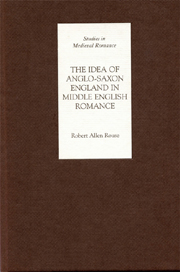Book contents
- Frontmatter
- Contents
- Miscellaneous Frontmatter
- Acknowledgments
- 1 Anglo-Saxonism: The Remembrance and Re-Imagining of the Anglo-Saxon Past
- 2 Remembering Alfred in the Twelfth Century
- 3 The Romance of the Anglo-Saxon Past
- 4 The Romance of English Identity
- 5 In his time were gode lawes: Romance and the English Legal Past
- 6 Literary Terrains and Textual Landscapes: The Importance of the Anglo-Saxon Past in Late-Medieval Winchester
- Conclusion
- Bibliography
- Index
4 - The Romance of English Identity
Published online by Cambridge University Press: 12 September 2012
- Frontmatter
- Contents
- Miscellaneous Frontmatter
- Acknowledgments
- 1 Anglo-Saxonism: The Remembrance and Re-Imagining of the Anglo-Saxon Past
- 2 Remembering Alfred in the Twelfth Century
- 3 The Romance of the Anglo-Saxon Past
- 4 The Romance of English Identity
- 5 In his time were gode lawes: Romance and the English Legal Past
- 6 Literary Terrains and Textual Landscapes: The Importance of the Anglo-Saxon Past in Late-Medieval Winchester
- Conclusion
- Bibliography
- Index
Summary
THORLAC Turville-Petre's work has opened up a fertile area of exploration regarding the significance of the Matter of England romances in the process of national identity formation. In this chapter I hope to throw some further light upon the question of English identity in these texts, and more specifically to question the relationship between the idea of Anglo-Saxon England and the idea of England in the Matter of England romances. English identity within these romances is a complex issue; one that is complicated by ties between England and the continent, England's insular neighbours, and regionalism within England itself. In ‘Havelok and the History of the Nation’, Turville-Petre observes that ‘the establishment and exploration of a sense of a national identity is a major preoccupation of English writers of the late thirteenth and early fourteenth centuries: who are the English; where do they come from; what constitutes the English nation?’ He argues that Robert of Gloucester's Chronicle (c.1300), the Anonymous Short Metrical Chronicle (post 1307), and Robert Manning's Chronicle of 1338 all have important roles in this debate: they are concerned with shaping a sense of English identity that is based upon English history. Turville-Petre's identification of a discourse of English with late thirteenth-century and early fourteenth-century literature is illustrative of a wider trend in the recent work of many literary scholars and historians. ‘Englishness’ has become a topic of vigorous interest over the past two decades: in 2002 the social historian Robert Colls listed some thirty major studies of Englishness in the previous twenty years, with the majority being written in the previous ten.
- Type
- Chapter
- Information
- Publisher: Boydell & BrewerPrint publication year: 2005



